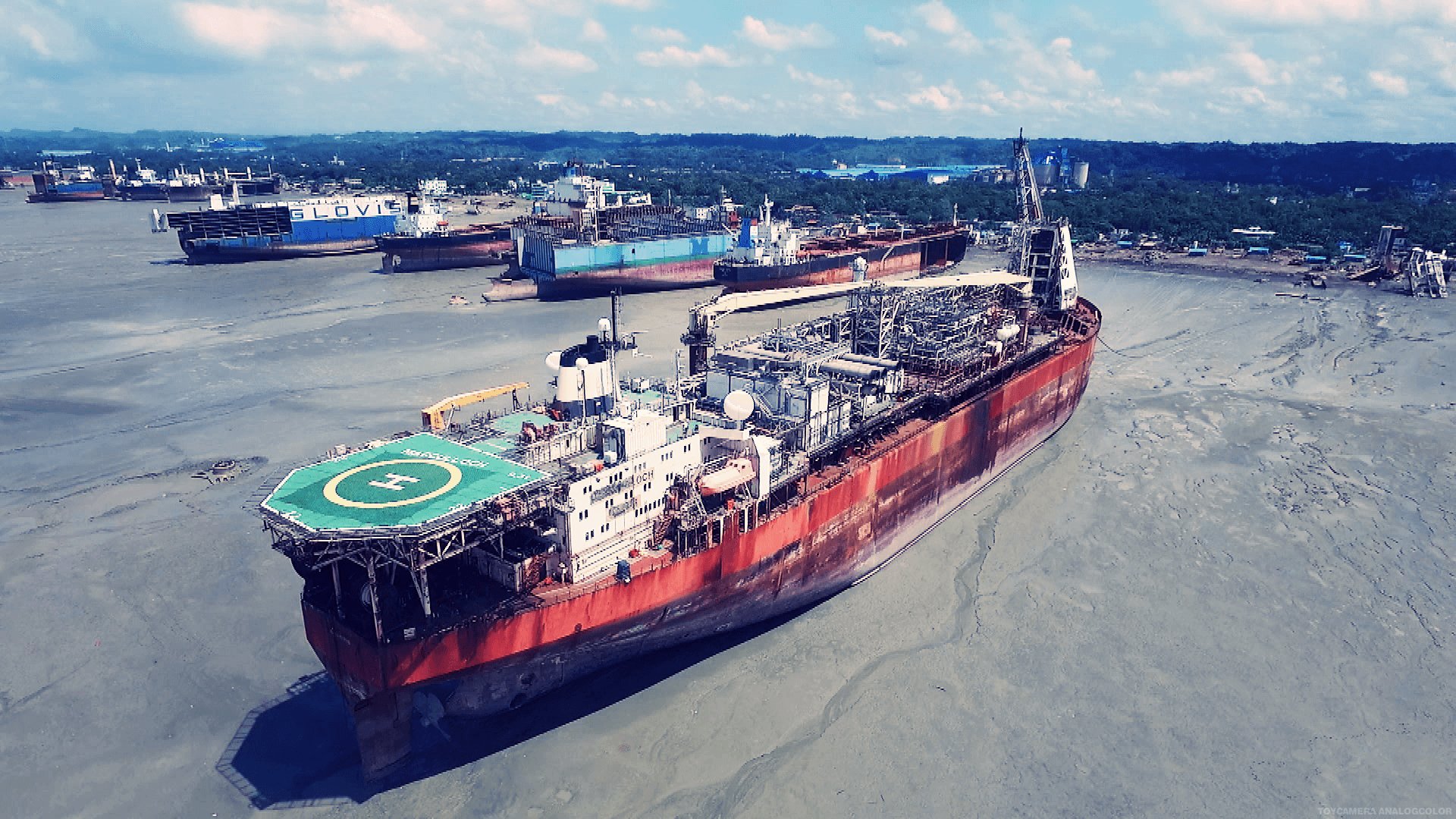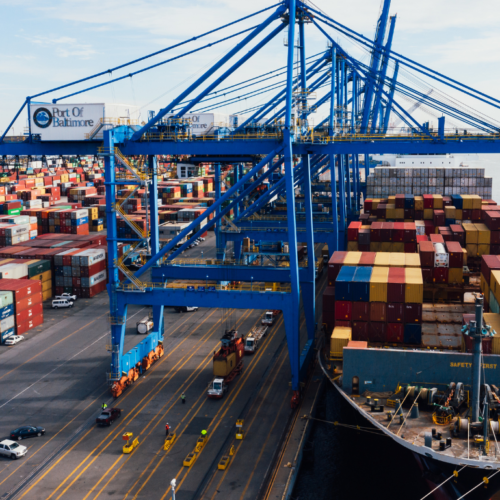Platform News – Maersk involved in illegal toxic waste trafficking
Contaminated North Sea oil production and storage tanker ends up on the beach in Bangladesh
The Maersk-owned floating oil production and storage tanker, North Sea Producer, left the UK in May 2016 and was directly towed to Bangladesh, where it arrived on 14 August 2016. Two days later, the North Sea Producer was beached at the Janata Steel shipbreaking yard in Chittagong. The vessel is likely to contain large amounts of highly contaminated residues including NORM (natural occurring radioactive material). It is currently being torn apart on a tidal beach, sadly known for the human rights abuses and environmental pollution caused by substandard shipbreaking. The tanker’s export from the UK for demolition in Bangladesh was illegal under the European Waste Shipment Regulation. The NGO Shipbreaking Platform calls on the UK Government to hold the Maersk-owned North Sea Production Company responsible for illegal trafficking in hazardous waste [1].

The case has recently been high up on the agenda of Danish media [2], prompting both policy makers and investors of Maersk, including Nordea, and pension funds PFA and KLP, to react. Whilst Maersk claims that they sold the vessel for further operational use, they have so far been unwilling to reveal which company from the oil and gas sector bought the vessel and claimed to be able to operate it. Taking the current market conditions into account, it was highly unlikely that Maersk was able to find a new owner for the North Sea Producer within the oil and gas sector.
The North Sea Producer was owned and operated by UK-based North Sea Production Company, a joint venture between Danish Maersk and Brazilian oil & gas company Odebrecht, with 50% ownership each. Having operated in the North Sea as an FPSO [3], the vessel is likely to contain large amounts of residues that are contaminated by NORM and sulphur in addition to the various other hazardous materials in its structure and tanks. The Bangladesh shipbreaking yards are not equipped with any infrastructure that could safely remove and dispose of such toxic wastes. The North Sea Producer was allowed into Bangladesh based on a fake certificate stating that the tanker did not contain any hazardous materials. The import of end-of-life ships containing hazardous waste into Bangladesh is banned, but circumvented with such false documents.

In late April, local newspapers wrote about the sale of the North Sea Producer. The North Sea Production Company was quoted as still being the owner and soon to strike a deal of which the details were confidential. Later, the newspapers stated to have been informed that the FPSO would be reused at the Tin Can Island Port in Nigeria. However, when the ship left Teesport, UK, on 17 May it sailed straight to Bangladesh, with only a few fuel stops for the tug boat Terasea Hawk on its way. Its first stop was in Namibia – way beyond the stated destination in Nigeria.

A Saint Kitts and Nevis-based postbox company, Conquistador Shipping Corporation, [3] became the new registered owner of the ship during its last voyage. Contracts for the vessel with Janata Steel shipbreaking yard were signed with the help of a Chittagong-based agent. It is likely that GMS is behind Conquistador Shipping Corporation which is used for last voyage ship registration. GMS has been involved in similar cases before, such as in 2012 when they used anonymous post box companies in Panama and the end-of-life flag of Belize to illegally export two French ferries, SeaFrance’s Cézanne and Renoir, from France to India.
In the coming years a high number of vessels, including semi-submersible platforms, used by the oil and gas sector operating in the North Sea will be decommissioned. Some of these structures have already ended up on the South Asian beaches for breaking under conditions that are both dangerous and polluting.

NOTES
[1] The Platform has sent a letter to the UK Environment Minister on 25 October.
[2] In addition to the Danwatch report, see also coverage in Danish TV2 and Politiken.
[3] The North Sea Producer was used as an oil and gas floating production storage and offloading (FPSO) vessel in the North Sea at the MacCulloch oil field, 250km north-east of Aberdeen, for ConocoPhillips. When the MacCulloch field was closed, the FPSO was brought to Teesport in Middleborough.
[4] Conquistador Shipping Corporation is domiciled at P.O. Box 583, Morton House - Government
Road Charlestown, Nevis. Offshore leaks documentation clearly indicated this is a typical post box company address. See also this link. In order to disguise their involvement in the sale of end-of-life vessels, cash buyers usually use anonymous post box companies, often located in the state whose flag of convenience is used for the last voyage. Similarly, the contracts with the local shipbreaking yard, or papers for the authorities, are signed by local agents so that the name and signature of the cash buyer does not appear on any document.
Related news

Platform News – Clean Shipping Coalition: Maersk undermines its reputation with plan to circumvent ship recycling law
The Clean Shipping Coalition criticises container ship giant Maersk for its statement that is considers to flag out end-of-life vessels from the Danish or other European registries… Read More

Platform publishes South Asia Quarterly Update #21
There were a total of 166 ships broken in the first quarter of 2020. Of these, 126 ships were sold to the beaches of South Asia for dirty and dangerous breaking.
... Read More
Platform News – Surge of fatal accidents in Chittagong
At least five shipbreaking workers have been killed and five more severely injured in a series of fatal accidents in Bangladesh in one month only. On… Read More

Press Release – NGOs organise event on sustainable maritime transport on 31 May in Lisbon
On 31 May, between 2PM and 7:30PM, the NGOs ZERO, Sciaena, NGO Shipbreaking Platform and Circular Economy Portugal are organising the conference “Waves of change: towards circular… Read More

Press Release – Ship owner and two directors fined by Dutch Court for breaching EU waste law
Dutch company Jumbo and two of its directors fined for their involvement in the illegal export of an end-of-life ship to Turkey for recycling.
... Read More
Press Release – Ship recycling workers’ protest shakes Aliaga
Around 1500 workers are claiming that they do not earn enough money.
... Read More